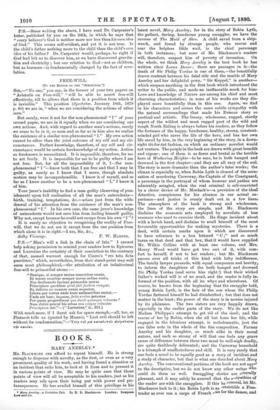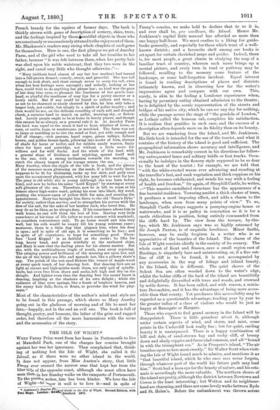BOOKS.
MARY ANERLEY.*
Ma. BIACKMORE can afford to repeat himself. He is strong enough to dispense with novelty, as the first, or even as a very prominent quality of his work, and having found a situation or an incident that suits him, to look at it from and to present it in various points of view. He may be quite sure that those points of view will all be acceptable to his readers, just as his readers may rely upon their being put with power and pic- turesqueness. He has availed himself of this privilege in his • Mary Anerley : e Yorkshire Tale. By H. D. Blackmon:. London : Sampson Low and Co. latest novel, Mary Anerley; for in the story of Robin Lyth, the gallant, daring, handsome young smuggler, we have the reverse of The Maid of Sher. A child saved from a ship- wreck, and found by strange people, who rescue and rear the helpless little waif, 'is the chief personage in both instances ; but none of Mr. Blackmore's readers will, therefore, suspect him of poverty of invention. On the whole, we think Mary Anerley is the best book he has written since Lorna Doone ; there are passages in it—the death of Sir Philip Yordas is one of them,—the beautifully drawn contrast between his fatal ride and the ramble of Mary Anerley and her delightful pony, " Sir Keppel," is another— which surpass anything in the first book which introduced the writer to the public, and made an ineffaceable mark for him. Love and knowledge of Nature are among his chief and most charming characteristics ; in none of his works are they dis- played more bountifully than in this one. Again, we find in his characters and scenes the same subtle sympathy with the natural surroundings that made his Exmoor story so poetical and artistic. The breezy, wholesome, rugged, sturdy aspect of the wildest and most rugged part of the wild and rough North Riding is always before his readers, as they follow the fortunes of the happy, handsome, healthy, strong, constant- minded girl who saves the life of the hero, and has her own life saved by him, in the very beginning of the story, in a down• right tit-for-tat fashion, on which an ordinary novelist would not venture. The people in the book are drawn with great breadth and vigour; one of them is as fierce and brutal as the terrible hero of Wuthering Heights—to be sure, he is both hanged and drowned in the first chapter—and they are all racy of the soil. The story is more dramatic than the author's later works ; the climax is especially so, when Robin Lyth is cleared of the accu- sation of murdering Carroway, the Captain of the Coastguard, a personage in the portrayal of whom humour and pathos are admirably mingled, when the real criminal is self-convicted by a clever device of Mr. Mordack's—a prevision of the ideal detective, conspicuous for his absence in our actual ex- perience—and justice is evenly dealt out in a few lines. The atmosphere of the book is strong and wholesome, the lines of the story are simple, and Mr. Blackmore disdains the economic arts employed by novelists of less resource who need to exercise thrift. He flings incident about with a lavish hand, and disdains to avail himself of the most favourable opportunities for making mysteries. There is a deed, with certain marks upon it which are discovered to have reference to a box lettered ".0 ;" and so much turns on that deed and that box, that it would have supplied Mr. Wilkie Collins with at least one volume, and Mrs. Henry Wood would have got two out of it, with com- fort to herself, if not to her readers ; but Mr. Blackmore passes over all tricks of this kind with lofty indifference. The family lawyer proceeds, with equal composure and brevity, to inform the daughters of the both hanged and drowned Sir Philip Yordas (and serve him right !) that their wicked father's wicked will is of no avail, and the reader is fully in- formed of the position, with all its whys and wherefores. Of course, he knows from the beginning that the smuggler bold, young Robin Lyth, is the heir of the son whom Sir Philip Yordas flattered himself be had disinherited ; but that does not matter in the least; the power of the story is in nowise injured by its plainness. The two sisters are very happily drawn, especially in the earlier parts of the story. We do not like Madam Philippa's attempt to get rid of the deed; and the rescue of her by Robin, when she all but loses her life, while engaged in the felonious attempt, is melodramatic, just the one false note in the whole of the fine composition. Farmer Anerley and his daughter, so much alike in their moral nature, and each so strong of will that one feels any grave cause of difference between these two must be well-nigh deadly, are quite faultlessly delineated; and the Carroway household is a triumph of unaffectedness and skill. It is very rarely that one feels a novel to be equally good as a story of incident and a study of character, but that is what one does feel about Mary Anerley. The conversational portions of the book are not equa to the descriptive, but we do not know any other writer who could do them so well. Smuggling stories are -OnerallY pleasant, and it may safely be averred that the IF-J1patlnes of
trader as ever ran a cargo of French the reader are with the smugglers. If this be zomoral, let Mr.
pots for the dames, and
Blackmore look to it ; his Robin Lyth is as ''resistible a Free- French brandy for the squires of former days. The book is thickly strewn with gems of description of scenery, skies, trees, and the feelings inspired by theseeeautiful objects in those who are consciously or unconsciously attuned to the enjoyment of them. Mr. Blackmore's readers may string whole chaplets of such gems for themselves. Here is one, the first glimpse we get of Anerley Farm, and of the girl who used to take all her troubles to her father, because " it was felt between them, when her pretty hair was shed upon his noble waistcoat, that they two were in the right, and cared very little who thought otherwise :"—
" Mary (without heed almost of any but her mother) had turned into a full-grown damsel, comely, sweet, and graceful. She was tall enough to look short, and short enough never to seem too tall, even when her best feelings were outraged ; and nobody, looking at her face, could wish to do anything but please her ; so kind was the gaze of her deep blue eyes, so pleasant the frankness of her gentle fore- head, so playful the readiness of rosy lips for a pretty answer or a lovely smile. But if any could be found so callous and mom as not to be charmed or nicely cheered by this, let him only take a longer look, not rudely, but simply in a spirit of polite inquiry ; and then would he see, on the delicate rounding of each soft and dimpled cheek, a carmine hard to match on pallet, morning sky, or flower- bed. Lovely people ought to be at home in lovely places, and though this cannot be so always, as a general rule it is. At Anerley Farm the land was equal to the stock it had to bear, whether of trees, or corn, or cattle, hogs, or mushrooms, or mankind. The farm was not so large or rambling as to tire the mind or foot, yet wide enough and full of change,—rich pasture, hazel copse, green valleys, follows brown, and golden breast-lands, pillowing into nooks of fern, clumps of shade for horse or heifer, and for rabbits sandy warren, farzy clove for hare and partridge, not without a little mere for willows and for wild ducks. And the whole of the land, with a general slope of liveliness and rejoicing, spread itself well to the sun, with a strong inclination towards the morning, to
catch the cheery import of his voyage across the sea. Mary Anerley, when the ripple of the tide is fresh, and the glance of the summer morn glistening on the sands, if a little rocky basin happens to be St for shrimping, tucks up her skirt, and gaily runs upon the accustomed playground, with her pony left to wait for her. The pony is old while she is young (although she was born before him), and now he belies his name Lord Beppel ' by starting at every soft glimmer of the sea. Therefore, now he is left to roam at his leisure above high-water mark, poking his nose into black, dry weed, probing the winnow-casts of yellow drift for oats, and snorting dis- appointment. Mary has brought him down to the old Dane's Dyke' for society, rather than service. and to strengthen his nerves with 'the dew of the salt, for the sake of her brother Jack, who loved him. He may do as he likes, as he always does. If his conscience allows him to walk home, no one will think the less of him. Having very little conscience at his time of life (after so much contact with mankind), he considers convenience only. To go home would suit him very well, but his crib would be empty till his young mistress came ; moreover, there is a little dog that plagues him, when his door is open ; and in spite of old age, it is something to be free ; and in spite of all experience, to hope for something good. There- fore Lord ' is as faithful as the rocks ; he lifts his long, heavy head, and gazes wistfully at the anchored ships, and Mary is sure that the darling pines for his absent master. But she, with the multitudinous tingle of youth, runs away rejoicing. The crisping power and brilliance of the morning are upon her, and the air of the bright sea lifts and spreads her, like a pillowy skate's egg. The polish of the wet sand flickers like veneer of maple-wood at every quick touch of her dancing feet. Her dancing feet are as light as nature and high-spirits made them, not only quit of spindle- heels, but even free from shoes and socks, left high and dry on the shingle. And lighter even than the dancing feet the merry heart is dancing, laughing at the shadows of its own delight ; while the radiance of blue eyes springs, like a fount of brighter heaven, and the sunny hair falls, flows, or floats, to provoke the wind for play- mate."
Most of the characteristics of the author's mind and style are to be found in this passage, which shows us Mary Anerley going out in the gladness of morning and of life to meet her fate,—happily, not in the end an evil one. The book is full of thought, poetry, and humour, the latter of the grim and rugged order, but therefore all the more harmonious with the scene and the accessories of the story.



































 Previous page
Previous page